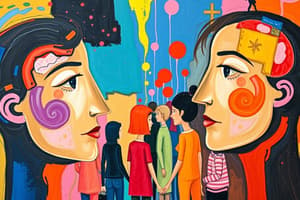Podcast
Questions and Answers
Which aspect of the self involves our physical body and ability to survive in the material world?
Which aspect of the self involves our physical body and ability to survive in the material world?
- Spiritual
- Emotional
- Mental
- Physical (correct)
The emotional aspect of the self allows us to experience life deeply and relate to others on a feeling level.
The emotional aspect of the self allows us to experience life deeply and relate to others on a feeling level.
True (A)
What do social factors refer to?
What do social factors refer to?
The influences of significant people in a person’s life such as family, peers, schoolmates, and neighbors.
What is heredity?
What is heredity?
The _____ aspect of the self connects us with the universal source and oneness of all life.
The _____ aspect of the self connects us with the universal source and oneness of all life.
What are the characteristics of a condition caused by an extra sex chromosome (XXY)?
What are the characteristics of a condition caused by an extra sex chromosome (XXY)?
How often does the condition caused by an extra sex chromosome affect male births?
How often does the condition caused by an extra sex chromosome affect male births?
What is a characteristic of Turner syndrome?
What is a characteristic of Turner syndrome?
What genetic condition is characterized by the presence of an extra sex chromosome in males?
What genetic condition is characterized by the presence of an extra sex chromosome in males?
How many male births are affected by Klinefelter syndrome?
How many male births are affected by Klinefelter syndrome?
Which of the following is NOT a characteristic of Klinefelter syndrome?
Which of the following is NOT a characteristic of Klinefelter syndrome?
What defines heredity in the context of physical self-development?
What defines heredity in the context of physical self-development?
What is the purpose of fertilization in human reproduction?
What is the purpose of fertilization in human reproduction?
What typically occurs every 28 days in the female reproductive cycle?
What typically occurs every 28 days in the female reproductive cycle?
Which chromosome abnormality is associated with Down Syndrome?
Which chromosome abnormality is associated with Down Syndrome?
What characteristic does NOT typically associate with Down Syndrome?
What characteristic does NOT typically associate with Down Syndrome?
What is the role of chromosomes in human reproduction?
What is the role of chromosomes in human reproduction?
Flashcards are hidden until you start studying
Study Notes
Aspects of the Self
- The self is shaped by social interactions, evolving through experiences and activities over time.
- Consists of multiple dimensions: physical, social, emotional, mental, and spiritual.
Physical Aspect
- Represents the body and includes survival skills and care for one's physical health.
- Emphasizes the importance of enjoying and maintaining the body.
Social Aspect
- Involves behavior in social contexts and interactions within various groups (families, communities, etc.).
- Healthy social connections enhance life satisfaction and well-being.
Emotional Aspect
- Relates to the capacity for deep experiences and emotional connections with others.
- Development here allows individuals to engage fully with life and relationships.
Mental Aspect
- Refers to intellectual abilities, thoughts, beliefs, and values.
- A developed mental self promotes clear thinking and openness to knowledge.
Spiritual Aspect
- Involves the inner essence or soul, connecting individuals to a greater universe.
- Fostering spiritual awareness brings purpose and belonging in life.
Factors of the Self
- Social Factor: Influences from significant individuals (family, peers, etc.) shape personal development.
- Environmental Factor: Physical surroundings impact experiences and include elements like climate and culture.
- Heredity: Genetic traits passed through generations significantly affect individual characteristics.
- Person-volition: The drive to create a unique identity leads to personal differentiation and innovation.
Physical Self Development Factors
- Highlights the importance of genetic factors in physical development.
- Examples include conditions such as Klinefelter syndrome, which is a genetic disorder resulting from an extra sex chromosome (XXY).
- Klinefelter syndrome predominantly affects males, leading to traits like sterility, underdeveloped secondary sex characteristics, and learning disorders.
- This condition occurs in approximately 1 in 1,000 male births.
Physical Self
- Physical appearance can significantly influence first impressions of others.
- Abnormalities in sex chromosomes can lead to disorders affecting physical health, such as:
- Klinefelter syndrome (XXY): Affects males, leading to sterility, underdeveloped secondary sex characteristics, small testes, and possibly learning disorders. Occurs in approximately 1 in 1,000 male births.
- Turner syndrome (XO): Affects females, characterized by short stature, webbed neck, impaired spatial abilities, infertility, and underdeveloped sex organs. Affects around 1 in 1,500 to 2,500 female births.
- Down Syndrome (Trisomy-21): Caused by an extra 21st chromosome, leading to moderate to severe intellectual disability, distinctive facial features, and physical traits such as a single palm crease. The risk increases with the age of parents.
Biology of Sex
- Biological sex differentiates between males, females, and intersex individuals.
- Sperm and ovum combine during fertilization to form a zygote, leading to the formation of a new individual.
- Both parents contribute equal chromosomes containing genes that determine individual characteristics.
- Sexual characteristics include:
- Primary sex characteristics: Related directly to reproductive systems.
- Secondary sex characteristics: Not directly involved in reproduction but distinguish sexes.
Body Image & Self-Esteem
- Body image affects self-worth and perceptions of attraction, playing a crucial role in self-esteem.
- Societal preferences regarding physical appearance fluctuate and impact how individuals perceive their own attractiveness.
Sexual Development in Adolescents
- Adolescents may explore sexual urges leading to engagement in sexual activities, with masturbation presented as a healthy alternative.
- Engaging in sexual activities can lead to significant consequences like:
- Pregnancy
- Sexually transmitted infections (STIs)
- Sexual orientation forms a complex interplay of personal identity and societal expectations, influencing attitudes toward homosexuality and acceptance of LGBT individuals.
Consequences of Sexual Choices
- Teenage pregnancy poses substantial responsibilities and risks, including health risks for both mothers and babies.
- Early parenting often leads to social disruptions such as school dropout or alienation.
- Approximately 50% of adolescent parents raise their children with help from family, while others may explore options like adoption or abortion.
- Research suggests higher rates of mental health challenges like depression and suicide among LGBT individuals due to societal exclusion and discrimination.
Studying That Suits You
Use AI to generate personalized quizzes and flashcards to suit your learning preferences.




